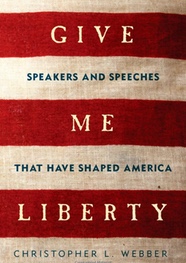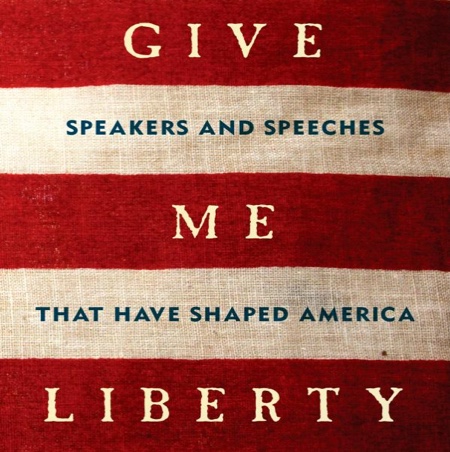The Question We Need to Remember to Ask Ourselves If We Want to Keep Our Freedoms
Patrick Henry was on his feet again, still “uneasy,” still challenging and questioning, still unwilling to give his support to the proposed new Constitution for the projected “United States of America.” For twenty-three days the debate went on and on every day but five, Henry was on his feet to protest, to challenge, to question. He was “uneasy,” he told his fellow delegates in Richmond, Virginia, in June of 1788 (he used the same word five times in his first few sentences), and he feared the consequences of delegating such powers to the proposed new government. “What if” the president were ambitious? What if the senators were corrupt?
 Fourteen
years earlier Henry had posed his famous alternative: “give me
liberty or give me death.” Now his fellow citizens had assembled
to see whether they could agree on some compromise between those
stark alternatives. Edmund Pendleton, another leading delegate, was
clear that there must be a way for society to order its affairs. In
answer to Henry’s ceaseless rhetorical questions, Pendleton posed a
question of his own: “Can society be formed without government?”
“There is no quarrel,” he assured the delegates “between
government and liberty; the former is the shield and protector of the
latter.”
Fourteen
years earlier Henry had posed his famous alternative: “give me
liberty or give me death.” Now his fellow citizens had assembled
to see whether they could agree on some compromise between those
stark alternatives. Edmund Pendleton, another leading delegate, was
clear that there must be a way for society to order its affairs. In
answer to Henry’s ceaseless rhetorical questions, Pendleton posed a
question of his own: “Can society be formed without government?”
“There is no quarrel,” he assured the delegates “between
government and liberty; the former is the shield and protector of the
latter.”
As the debate droned on, Pendleton took the opportunity to point out that Henry himself had illustrated the need for a government that could protect the citizens from each other. While serving as Governor of Virginia, Patrick Henry had worked with Thomas Jefferson, the leader in the legislature, to execute a famous criminal without any judicial procedure. “Shocking (and) horrid” were among the terms Pendleton applied to what Henry had done. But Henry saw no problem. The man was “a fugitive murderer and an outlaw” who had “committed the most cruel and shocking barbarities.” He had seen no need to bother with “beautiful legal ceremonies.” The man was not entitled to them. Patrick had the liberty to bring death to the criminal.
The Virginia delegates had assembled knowing that eight states had ratified the Constitution and nine states were needed to implement it so their decision could be critical. The long days of debate, however, delayed a decision and New Hampshire had already become the ninth state to ratify before the Virginians could end their debate and vote narrowly (89-79) in favor of moving ahead. New York became the eleventh state to ratify the Constitution in July and the Constitution went into effect in March 1789. Belatedly and narrowly the remaining two colonies, North Carolina and Rhode Island, ratified it as well and the great experiment in democratic government was under way. The debate over the role of government in a free society, however, continues along the same lines as those set out by Pendleton and Henry. How much government is too much? How can a proper balance be struck - and struck again in constantly changing circumstances - between the power government needs to be effective and the freedom individuals need to live as fully as possible?
Throughout American history a critical aspect of that debate has centered on freeing individuals – African Americans, women, sexual and ethnic minorities – from restraints of law and custom. The most burning issue, the right of certain states to allow certain individuals to be held in bondage, exploded in violence in the most destructive war in our history and its lasting effects continue to break out in violent episodes, most recently in Ferguson, Missouri. But if laws should not be used to restrict freedom, can they be used to enhance freedom? Should government provide special opportunities for veterans, for minorities, for immigrants? Should government protect us from ourselves by restrictions on the sale or use of alcohol, tobacco, drugs, and guns or requiring us to buy health insurance? Should government protect industry against unfair foreign competition or should government support commercial industry by providing roads, airports, and harbors for corporations to move the materials they need and the goods they manufacture, or should government limit the freedom of industry by requiring standards of industrial safety, by limiting pollution of air and water, by setting a minimum wage? How much can my freedom be restricted to enhance the freedom of others?
And what if – to return to Patrick Henry’s question – what if individuals, be they presidents or senators or minor office holders are ambitious or corrupt? Again and again they have proved to be so and have been corrupted, often, with surprising ease. And what if citizens and their representatives allow a president to send troops here or there with minimum debate or hold people in prison without trial for years on end or strike down American citizens and others from unmanned aircraft without any legal procedure at all? My freedom may not be at issue, at least in the short term, but what responsibility do I have for the freedom of others?
A surprising discovery to me as I have researched the ongoing debate about freedom is the frequency with which its greatest exponents have spoken of the need for America to set an example, to be a beacon for others. John Winthrop’s frequently quoted and misquoted words about a “city on a hill” established a theme that has been held up again and again in our history.
Abraham Lincoln saw the Civil War as a desperate struggle not simply to preserve the Union but to ensure that “government of the people, by the people, and for the people shall not perish from the earth.” During World War II Franklin Roosevelt held up the “Four Freedoms” as a standard for all people and told the congress that “the future and the safety of our country and of our democracy are overwhelmingly involved in events far beyond our borders.” Martin Luther King, Jr. accepted the Nobel Peace Prize “on behalf of all men who love peace and brotherhood.”
What if Patrick Henry had not held up the standard of liberty and what if Frederick Douglass and other had not worked to extend that liberty even to slaves? What if Elizabeth Cady Stanton and Susan B. Anthony had not insisted that women too were entitled to the full liberty of citizens? What if William Jennings Bryan had not insisted that political freedom involved economic freedom for workers and farmers? What if orators as different as Ronald Reagan and Martin Luther King, Jr. had not challenged us to reconsider that founding principle and rededicate ourselves to its meaning?
Give Me Liberty is the story of the men and women who have challenged us again and again to think beyond ourselves and renew our commitment to liberty for ourselves and all the world. Today in Russia and China we see massive experiments in the possibility that governments can keep their populations content without political freedom. What if they were to succeed? What if the experiment in liberty should perish from the earth or be limited to America and other western democracies? Now more than ever Americans need to remember our founding values and those who have been its advocates. What if we were to forget that long and continuing struggle for liberty?
